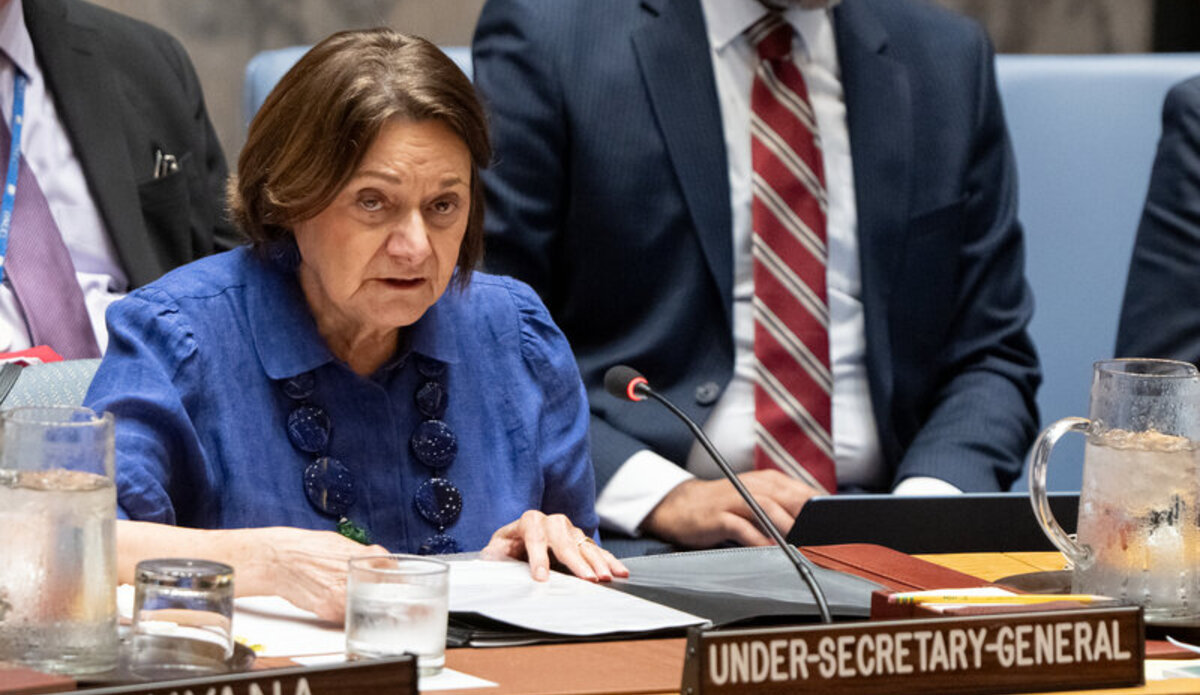Remarks by Rosemary DiCarlo,
Under-Secretary-General for Political and Peacebuilding Affairs
Security Council briefing on Non-proliferation (Iran)
New York, 24 June 2025
Madame President,
Thank you for the opportunity to brief the Council on the Joint Comprehensive Plan of Action (JCPOA) and the implementation of resolution 2231 (2015).
As the Secretary-General noted in his latest report, with less than four months left until the termination of its provisions, the objectives of resolution 2231 (2015), and those of the JCPOA, have yet to be fully realized. This is regrettable.
The JCPOA was adopted in 2015 to ensure that the Islamic Republic of Iran’s nuclear program would be exclusively peaceful. It included sanctions relief, nuclear program restrictions and monitoring and verification.
The JCPOA has faced many challenges since its inception, including the withdrawal of the United States from the agreement in 2018 and Iran’s withdrawal from some of its commitments as outlined in the Plan.
Still, over the last few months, JCPOA participants increased their efforts to identify a way forward for full implementation of the plan. In addition, Iran and the United States engaged in five rounds of bilateral talks, facilitated by Oman.
Regrettably, neither of these initiatives produced a way forward to ensuring the peaceful nature of Iran’s nuclear program.
The military escalation between Israel and Iran since 13 June and United States air strikes on Iran’s nuclear facilities on 21 June complicated prospects for achieving full implementation of Resolution 2231 (2015).
Iran’s strikes yesterday on a base in Qatar, an action which the Secretary-General condemned, further exacerbated insecurity in an already tense region.
Madame President,
Earlier today the Secretary-General welcomed the announcement by the United States, in coordination with Qatar, of a ceasefire agreement between Israel and Iran and urged them to respect it fully.
This is a significant achievement that potentially pulls Iran, Israel and the region back from the brink.
The people of Iran and Israel have already suffered too much.
According to the Iranian Ministry of Health, since the start of the conflict at least 606 people have been killed, with 107 killed in the past 24 hours, and 5,332 injured. According to Israeli authorities, 28 people were killed and 1,472 were injured during the conflict.
Madam President,
In its quarterly report of 31 May 2025, the International Atomic Energy Agency (IAEA) observed that the significantly increased production and accumulation of highly enriched uranium by the Islamic Republic of Iran was of serious concern.
The IAEA reiterated that its verification and monitoring activities related to the JCPOA have been “seriously affected by the cessation of implementation by Iran of its nuclear-related commitments” under the Plan.
The Agency also again noted that it had lost its continuity of knowledge on many aspects of Iran’s nuclear programme, as it had not been able to perform verification and monitoring activities in the Islamic Republic of Iran for more than four years.
In addition, the IAEA noted it was unable to verify the total stockpile of enriched uranium in the country and had not done so since February 2021.
During the reporting period, the Secretary-General received several communications from JCPOA participants.
On 17 March, the Permanent Representatives of China, the Islamic Republic of Iran and the Russian Federation shared a joint statement adopted at their meeting of 14 March in Beijing in which they stressed the importance of resolution 2231 (2015), including its timeframes.
In a separate letter received the same day, the Permanent Representative of China shared a proposal for the settlement of the Iranian nuclear issue, highlighting the JCPOA as the basis for a new consensus and cooperation through dialogue and a step-by-step and reciprocal approach.
In letters received on 9, 11 and 12 June, the Permanent Representatives of France, Germany, the United Kingdom the Islamic Republic of Iran and the Russian Federation shared their different views regarding the causes of the impasse in the implementation of Resolution 2231 (2015).
Despite their diverging outlooks, all five Member States reiterated the importance of negotiations and reaffirmed their commitment to finding a diplomatic solution.
Madame President,
I will now turn to the restrictive measures set out in annex B to resolution 2231 (2015). The only measures that remain in effect pertain to nuclear activities and transfers. Those measures will remain in place until 18 October 2025, unless decided otherwise by the Council.
The Secretariat received no allegations of violations of these provisions during the reporting period.
Moreover, no new proposals have been submitted in the procurement channel in the last six months of the reporting cycle.
The Security Council, however, received eight notifications regarding the nuclear-related restrictive measures for certain activities consistent with the JCPOA.
Madam President.
At the heart of this conflict is the nature of Iran’s nuclear programme.
Following the deadly clashes of the past 12 days, the ceasefire agreement is an opportunity to avoid a catastrophic escalation and achieve a peaceful resolution of the Iran nuclear issue.
Diplomacy, dialogue and verification remain the best option to ensure the exclusively peaceful nature of Iran’s nuclear programme and to bring about concrete economic benefits to the people of Iran.
As the Secretary-General said earlier today, the United Nations stands ready to support all efforts that advance peace, dialogue and stability in the region.
Finally, Madam President
The Secretariat will continue to support the implementation of resolution 2231 (2015) until the termination date of 18 October.
I would like to take this opportunity to thank His Excellency Samuel Žbogar of Slovenia for his leadership as Security Council Facilitator for the implementation of the resolution.
I also thank the Coordinator of the Procurement Working Group of the Joint Commissioner for our continued cooperation.
Thank you, Madame President.

